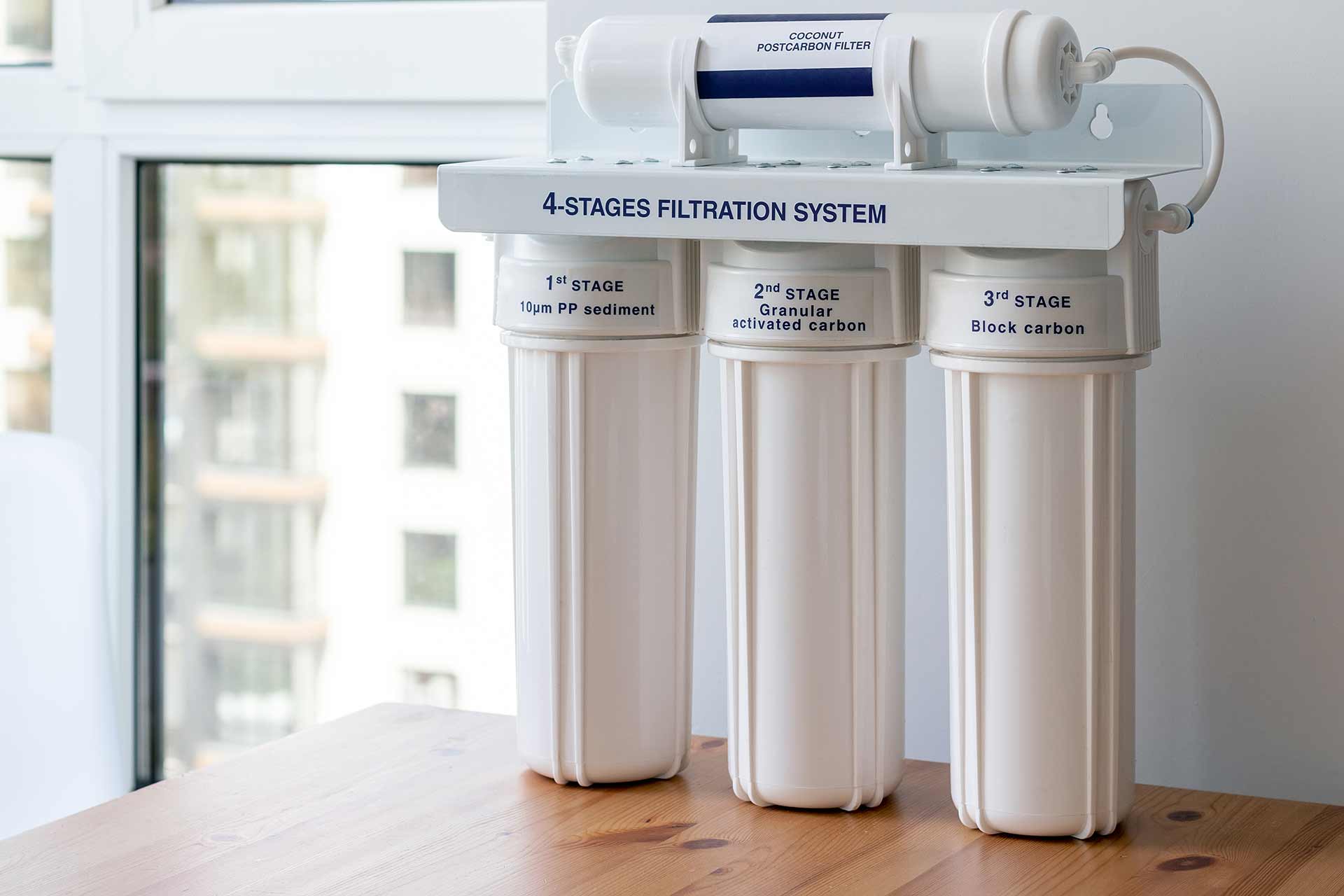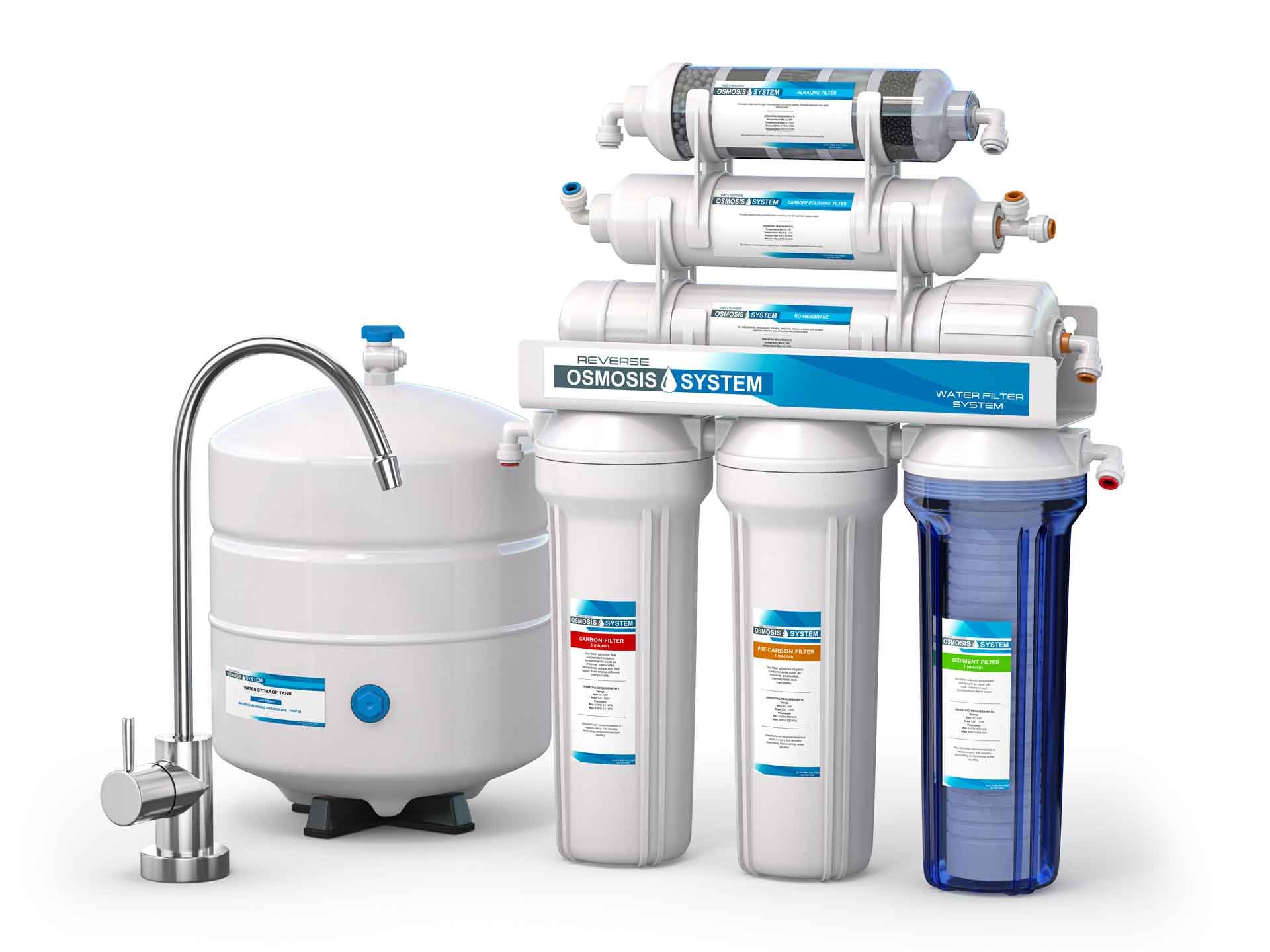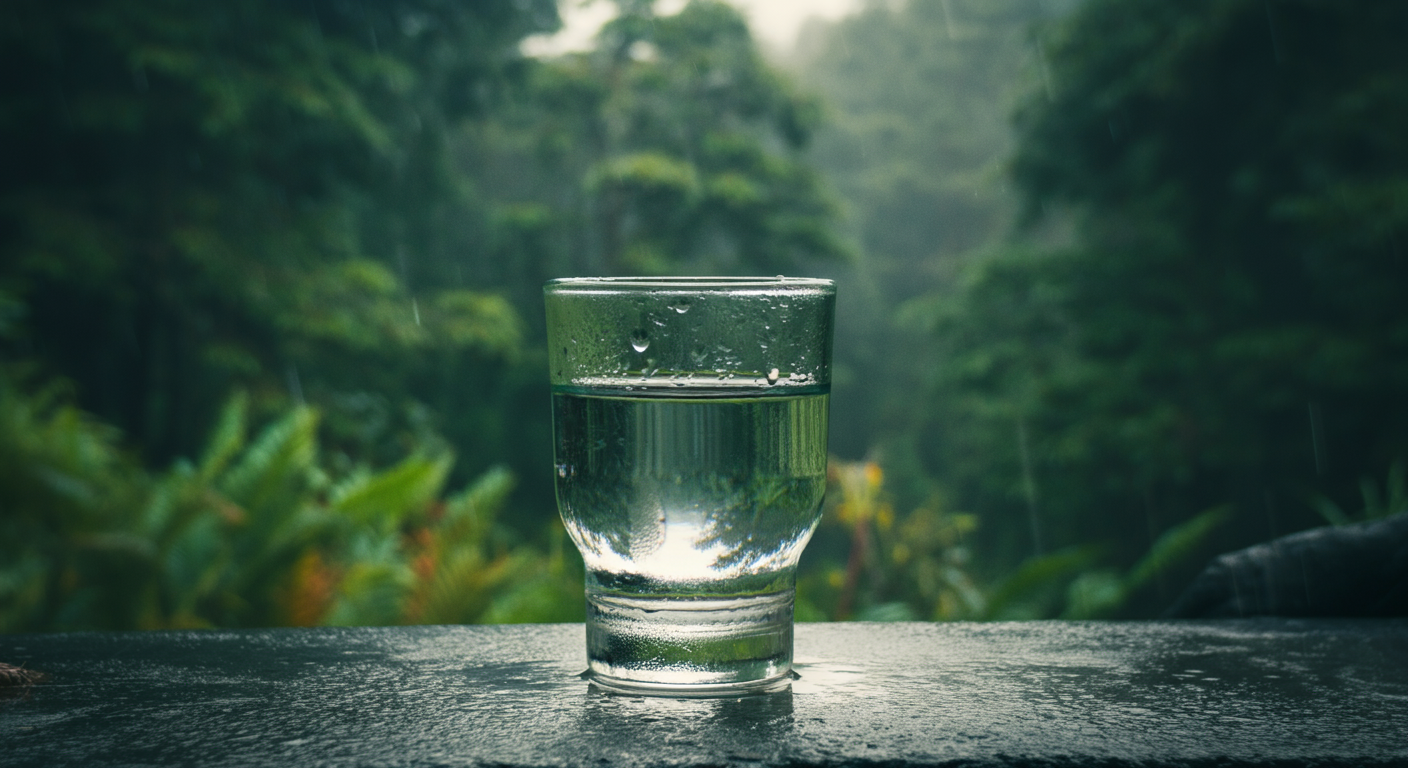
Untertischgerät anschließen: Anleitung
Ein Untertischgerät ist eine hervorragende Lösung für die dezentrale Warmwasserversorgung in Wohnungen und kleinen Häusern. Es ist

Wasserfilter-Expertin
Noch Fragen? Gratis Termin
Pure water (H2O) always consists of one oxygen molecule and two hydrogen molecules. However, this type of water does not occur in nature, as it may contain dissolved substances, for example mineral salts such as sodium, calcium or magnesium.
Hydrogen water – also known as „hydrogenated water“ or „hydrogen-enriched water“ – is water that is enriched with molecular hydrogen . In this process, hydrogen gas is injected into the water either by electrolysis or by using special hydrogen generators. The result is an artificially produced beverage that contains an increased concentration of hydrogen gas.
Chemically, however, hydrogen does not react with water and thus does not form any by-products. Hydrogen water therefore contains pure hydrogen, which does not affect the taste or smell of the water. In addition, hydrogen in drinking water is said to have positive effects on health . For example, there are now numerous studies proving that hydrogen-rich water – also called H2 water – can protect the body from diseases and free radicals.
The idea of enriching water with hydrogen gas is not new. The first studies on the potential health benefits of hydrogen water were conducted in Japan as early as the 1970s. At that time, it was found that hydrogen is a powerful antioxidant and can neutralize free radicals in the body. However, this research was forgotten for some time.
Although it has already been proven that people who drink water with a high lime content do not suffer any damage to their health, more and more consumers are turning to artificially enriched or filtered reverse osmosis water. The world-famous water springs at Tlacote el-Bajio in Mexico, Lourdes in France, and Nadana in India have also always been popular pilgrimage sites for people with chronic illnesses, as they were said to have healing and health-promoting powers. What was the cause of the therapeutic effect of this source remained undiscovered for a long time, until scientists finally discovered that these water sources had an exceptionally high content of molecular hydrogen.
Hydrogen water, for example, has only gained renewed attention in recent decades. Numerous scientific studies have been conducted to investigate the effects of hydrogen gas on the human body. Potential benefits were found in several areas such as anti-inflammation, cell protection, antioxidant activity and energy enhancement. In 2007 , Japanese scientists finally made a breakthrough – through targeted research, they were able to achieve the enrichment of drinking water with molecular hydrogen.
The exact mechanisms of how hydrogen water affects the body are not yet fully understood. However, hydrogen is believed to act as a powerful antioxidant , reducing oxidative damage in the body. Thus, one of the main causes of premature aging and chronic diseases is said to be oxidants. By neutralizing free radicals, hydrogen water is said to help reduce any inflammation caused by oxidants and slow down the aging process.
Some studies also suggest that hydrogen water may also have positive effects on metabolism and energy production . It is believed that hydrogen molecules are able to reach the mitochondria in our body cells and improve their function. This could lead to increased energy and performance.
It is important to note that despite the promising results, further research is still needed to understand the exact mechanisms of action and potential benefits of hydrogen water. There are also differing opinions in the scientific community, and some experts emphasize that further clinical studies are needed to make definitive statements about the health effects of hydrogen water.
The water consumption benefits are undisputed. Adequate hydration is vital and helps our bodies stay healthy. But drinking hydrogen-rich water in particular is said to bring numerous extraordinary benefits.
Hydrogen water is often touted as a supplement for athletic activities. It is believed that the antioxidant properties of hydrogen can help reduce muscle fatigue and shorten recovery time after exercise. Some studies have shown that hydrogen water can improve athletic performance and increase endurance. In addition, hydrogen water is said to offer the following benefits for athletes:
Activation of energy and fat metabolism
Combating inflammatory processes
Furthermore, hydrogen in drinking water does not form any by-products that are harmful to the human body. Sports physicians see this as a clear advantage over other sports drinks and recommend drinking hydrogen water both before and after exercise. Because of this, athletes and fitness enthusiasts are increasingly interested in this type of water.
In addition, hydrogen water is often discussed in connection with weight loss. It is speculated that the antioxidant properties may help boost metabolism and help the body burn fat. In addition, hydrogen is said to ensure that liver fat and blood sugar are reduced and also supply the body’s cells with oxygen and nutrients.
However, it is important to note that hydrogen water is not a miracle cure for weight loss and cannot replace a healthy diet and sufficient exercise. However, it can play a supportive role as part of a healthy lifestyle.
People with metabolic disorders such as diabetes, Hashimoto’s or obesity could also potentially benefit from hydrogen water. For example, some studies have shown that hydrogen water can improve blood sugar levels and insulin resistance in diabetics, among other things. It is believed that the antioxidant properties of hydrogen can reduce inflammation in the body and thus positively affect metabolism. In addition, regular intake of H2 water is said to strengthen the immune system in the long term and neutralize the influence of meteorological environmental conditions and allergic reactions.
It is also said that hydrogen-enriched water can be used preventively against numerous diseases such as arthritis, rheumatism or even cirrhosis of the liver. Nevertheless, it is important for sufferers to consult with their doctor before taking hydrogen water.
Another much-discussed aspect is the potential beauty benefits of hydrogen water. It is claimed that it can help improve the appearance of the skin by reducing oxidative stress and protecting the skin from free radical damage. Some users report smoother and more radiant skin after regular consumption of hydrogen water. However, more studies are needed to support these claims and confirm the exact effects on skin health.
To be able to produce hydrogen water, a certain process is necessary. In the meantime, however, the enrichment of drinking water with hydrogen can be successful not only in the laboratory, but also for consumers in their own homes. A particularly convenient and safe method for this is a so-called hydrogen-water generator.
A hydrogen-water generator is a special device designed to enrich water with molecular hydrogen. The generator usually works with the electrolysis method. In the process, water is split into its components, hydrogen and oxygen. The hydrogen is then captured and mixed with the water to produce hydrogen water.
The electrolysis process in a hydrogen-water generator takes place in a closed chamber. An electrode – also called a cathode – made of platinum or a similar material is immersed in the water. By applying an electrical voltage, hydrogen ions (H+) are generated at the cathode and migrate through the electrolyte solution to the anode. There they react with electrons to form molecular hydrogen (H2).
The hydrogen is formed when the water molecules lose two electrons at the anode. These in turn form four hydrogen ions and one oxygen molecule. The hydrogen ions are attracted to the negatively charged cathode and pass through the ion exchange membrane. Meanwhile, the ions attract and react with four electrons to form two hydrogen molecules. This released hydrogen is then dissolved into the water and the resulting oxygen is released into the environment. The result is drinking water enriched with molecular hydrogen, which contains all the potential positive health properties.
However, it is important to note that hydrogen-water generators are specifically designed to produce hydrogen water and the hydrogen concentration is usually maintained at a certain level. It is recommended to carefully follow the manufacturer’s instructions and safety precautions to ensure proper use of the generator.
Although a hydrogen water generator is the classic method of producing hydrogen water using water ionizers, there are several other ways to produce the popular hydrogen water. An alternative and particularly simple method is to use hydrogen tablets or capsules dissolved in water. These tablets or capsules usually contain a compound that releases molecular hydrogen when it reacts with water.
Another method is to use hydrogen gas cylinders or tanks to directly saturate the water with hydrogen. However, extreme caution should be exercised here, as handling compressed hydrogen can be dangerous. It is recommended that this be done only by professionals.
It is also possible to produce hydrogen water by introducing hydrogen gas into a closed bottle containing water. Hydrogen gas from special hydrogen generators or hydrogen gas cylinders can be used for this purpose. These special hydrogen water bottles function similarly to other well-known devices on the market to carbonate conventional drinking water. At the touch of a button, hydrogen can be added to the water in the bottle, ready for use on the go, in the office or at the gym at any time. After the gas is introduced into the water, the bottle should be tightly closed and the water left for a period of time to allow the hydrogen gas to react with the water.
Hydrogen gas (H2) is being studied in medical research as a potential therapeutic gas. It is believed that hydrogen can have a protective effect on the body due to its antioxidant properties. As the smallest molecular size, it can easily penetrate cells and tissues to exert its antioxidant effects.
Thus, hydrogen gas is selective to strong oxidants and thus has the ability to neutralize free radicals and reduce oxidative stress reactions. As a result, it could have an anti-inflammatory effect, help restore so-called homeostasis, and reduce cell damage from oxidative stress. Hydrogen gas is also believed to be able to modulate certain signaling pathways in the body and influence the expression of genes associated with inflammation and cell protection.
In medical practice, hydrogen gas is used in various forms, including inhalation of gaseous hydrogen, intravenous administration of hydrogen-rich fluids, or use of hydrogen-enriched water. In addition, research is being conducted in various areas of medicine, including neurological diseases, cardiovascular diseases, inflammatory disorders and more.
Although research on the therapeutic effects of hydrogen gas are promising, further clinical studies are needed to confirm the exact mechanisms and optimal application. Nevertheless, industry in the Far East is already using hydrogen gas for therapeutic treatment. However, the results of numerous studies remain to be seen to better understand the efficacy and application of hydrogen gas as a therapy. Thus, physicians may not be familiar with these mechanisms, and the effects of hydrogen gas often become apparent only when toxins are used to treat problems.
It is important to consult with experts and rely on scientific evidence before using hydrogen gas as a therapy. In addition, this type of therapy should be done exclusively under medical supervision and should be individually tailored to specific needs and health conditions.
A fascinating property of hydrogen gas (H2) is its ability to travel almost anywhere in the body within minutes. Because of its small molecular size, hydrogen gas can effortlessly penetrate cell membranes to the mitochondria and nucleus and distribute to various tissues and organs. This rapid distribution allows the hydrogen to potentially deliver its antioxidant effects to the desired locations in the body.
Thus, when hydrogen is drunk, it first enters the throat and sends signals that let the body know it is receiving something important. Many people experience improved clarity of mind and a refreshing feeling after drinking hydrogen-rich water for just a few minutes. Hydrogen thus acts as a signal molecule in the body and is said to have positive effects even in small quantities. Drinking hydrogen water, for example, increases the release of ghrelin – a neurotransmitter that stimulates growth hormone – in the stomach. In contrast, inhalation of hydrogen-rich air does not have the same effect because the contact is through the lungs and not the stomach. For this reason, drinking hydrogen water has gained acceptance on the global market faster than inhalation, which seems to be useful only for certain diseases.
An important characteristic of basic active water is the high content of dissolved hydrogen gas. Thus, a good water ionizer can achieve a hydrogen content of 1200 to 1300 micrograms per liter – and this already at a pH value of 9 and room temperature.
It is recommended to drink the water with a pH value of up to 9.5 , which means a hydrogen content of 1250 to 1450 micrograms per liter, depending on the ionizer. Some ionizers can even reach higher pH values such as pH 11, although you should not drink this permanently. In this case, the hydrogen content could be as high as 1800 micrograms per liter. This high dissolved hydrogen gas content can be used to transfer hydrogen to other foods. Since hydrogen is willing to readily give up its electrons, this lowers the redox potential and results in an increased availability of electrons.
In addition to the potential health benefits for the human body, hydrogen gas is also being researched in the food industry. An interesting approach is to treat aged foods with hydrogen to improve their quality and shelf life. It is believed that the antioxidant properties of hydrogen can help slow the oxidative degradation of nutrients in foods and preserve their freshness longer. However, this technology is still under development and further studies are needed to confirm its efficacy and applicability.
Hydrogen water, or „hydrogen rich water,“ is an emerging trend that promises promising health benefits. Hydrogen is believed to act as a powerful antioxidant, reducing oxidative damage in the body. There is also evidence that hydrogen water can have positive effects in a number of areas including anti-inflammation, cell protection, energy improvement and possibly even weight loss. Nevertheless, it is important to note that further research is needed to understand the exact mechanisms of action and potential benefits of hydrogen water.
Although the effects of hydrogen water may be very promising, it should not be considered a panacea and should not replace the basics of a healthy lifestyle such as a balanced diet, physical activity and adequate sleep. The decision to consume hydrogen water is ultimately up to the individual and should be made based on personal needs and individual circumstances.
Hydrogen water is said to have numerous positive properties. Hydrogen water, for example, is said to be particularly suitable for athletes, as it is said to stimulate the metabolism. In addition, H2 water is said to be anti-inflammatory.
In principle, one should always consume 1 to 3 liters of water per day. Those who want to integrate hydrogen water into their daily water consumption due to its positive effects can safely consume one glass per day.
Yes, because there is hydrogen in all water – mainly in bonded form. Thus, H2O consists of one oxygen molecule and two hydrogen molecules. In hydrogen water, on the other hand, there is molecular hydrogen in addition to the bonded hydrogen.
For hydrogen to become water, it must react with oxygen. Only when a reaction of two hydrogen molecules with an oxygen molecule takes place can the two gaseous elements become liquid water.
Die enthaltenen Informationen können die Beratung durch einen Arzt nicht ersetzen; sie sind keine medizinischen Anweisungen. Die Inhalte dienen der Vermittlung von Wissen und sind nicht mit der individuellen Betreuung zu vergleichen. Die Umsetzung der hier gegebenen Empfehlungen sollte deshalb immer mit einem qualifizierten Experten abgesprochen werden. Das Befolgen der Empfehlungen erfolgt auf eigene Gefahr und in eigener Verantwortung.

Ein Untertischgerät ist eine hervorragende Lösung für die dezentrale Warmwasserversorgung in Wohnungen und kleinen Häusern. Es ist

Den Körper reinigen: Eine ungesunde Ernährungsweise und der Verzehr von Zusatzstoffen können gesundheitliche Probleme auslösen. Anhänger der

Die hohen Wasserkosten ärgern Sie? Woche für Woche greifen viele Menschen in Deutschland zu den teuren Glas-

Auch wenn das Trinkwasser in Deutschland strengen Qualitätskriterien unterliegt, wird die hauseigene Osmoseanlage sowohl in Firmen als

Es ist umsonst, es ist natürlich und es kann leicht aufbewahrt werden: Die Nutzung von Regenwasser liegt

Der Einsatz von Wasserfiltern gewinnt an Bedeutung, da sich immer mehr Menschen bewusst werden, wie wichtig sauberes

Wenn braunes Leitungswasser aus dem heimischen Wasserhahn kommt, kann das Verbraucher durchaus verunsichern. Die Verfärbung des Trinkwassers

Wenn Trinkwasser einen erhöhten Gehalt an Blei enthält, kann das eine Gefahr für die Gesundheit darstellen. Das

Unser Körper nimmt über den Tag verteilt verschiedene Stoffe auf, darunter leider auch Giftstoffe, die schädlich für
© 2025 SANQUELL Wasserfilter Deutschland. Alle Rechte vorbehalten
Alle Preise inkl. der gesetzlichen MwSt.
Die durchgestrichenen Preise entsprechen dem bisherigen Preis in diesem Online-Shop.
Geben Sie das gesuchte Produkt sein
Einfach beim gewünschten Produkt auf „ANGEBOT ANFORDERN“ klicken. Die Angebotsliste können Sie sofort per pdf downloaden.
Sofort-Rabatt auf unsere Wasserfilter-Komplettsets.
Nutzen Sie HEUTE folgenden Gutscheincode
Sie sehen gerade einen Platzhalterinhalt von Calendly. Um auf den eigentlichen Inhalt zuzugreifen, klicken Sie auf die Schaltfläche unten. Bitte beachten Sie, dass dabei Daten an Drittanbieter weitergegeben werden.
Mehr Informationen